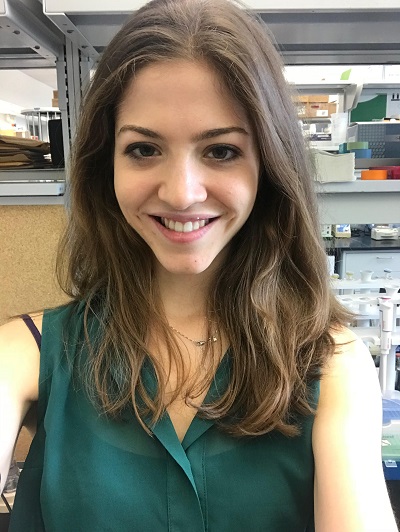‘Re-Capping’ Senior Year: Honors College Senior Discusses Final Project and Plans for the Future
Introduction
By Sam Scruby
Junior
History & Political Science
‘Re-Capping’ Senior Year: Honors College Senior Discusses Final Project and Plans for the Future

Federica Violi, an Honors College senior studying biology and on the pre-med track, recently completed her final Honors Capstone project with Principal Investigator Dr. Daniel Shaye in the UIC College of Medicine. After graduation, she plans to take a gap year before attending medical school.
Violi’s Capstone project focused on the kinase protein PIG-1 and tubulogenesis, the process of biological tube formation. Kinase is found in sea algae and in the nematode worm, which are believed to be involved in tubulogenesis in the excretory canal. Scientists believe kinase proteins have the same function in humans that they have in algae and the worms, and Dr. Shaye had found several kinase proteins involved in tube formation. However, the role of the protein PIG-1 was unclear—and in genetics, to find out what a protein does, scientists remove the protein from the genome and look at the phenotype. If the protein that corresponds to the gene is no longer produced, that allows researchers to see the gene’s role. The Shaye lab plans to determine where the proteins PIG-1 and EXC-6, found in worms and involved in the process of tubulogenesis, are localized in the excretory canal so they can understand the effect that the loss of those proteins has on the cell.
One of the things that Violi found the most rewarding about this project was that it helped to make previously abstract concepts into something more concrete. She remarked that it allowed her to learn more actively about protein functions, a topic she had studied for years in biology classes – after years of reading about proteins, she was finally able to interact with them and study them more closely. It also helped her put concepts she’d already learned into practice for the first time. Because Violi hadn’t taken a course focused on genetics until this past semester, it meant that a large part of the work she did was in a field that was mostly new to her. For all these reasons, she called it an empowering and fulfilling experience.
The benefits of the time Violi spent working on her Capstone weren’t just academic, but personal, too. She learned what she referred to as “the three Cs” of working in a group—communication, collaboration, and coordination—by working in a lab with assigned roles. Of these, Violi believed communication was especially important. Her first language is Italian, and she had to overcome initial difficulties speaking in front of the other lab members. However, Violi believes the initial difficulty getting past the language barrier that she encountered early on ultimately made her a better public speaker. Being a part of this experience also made her feel supported and helped her make connections with professionals in the field, like Dr. Shaye, who she said was always willing to offer advice. But the connections she made weren’t just with instructors – two of her best friends, she said, were undergraduates she met and worked with during her project.
This project isn’t the only major research endeavor that Violi has undertaken during her time at UIC. She has also been conducting research at Northwestern University investigating how the doctor-patient relationship changes when biopsies are ordered. Over the summer of 2018, she worked with Dr. Ashley Hughes on a project that examined the possibility of making robot-assisted surgery more affordable, presenting it at the Human Factors in Ergonomics and Health Care Symposium in Chicago. Most recently, she traveled to Johns Hopkins University in March of this year to present a project she’s been working on that observes how college students’ mental health is affected by social media. Violi said that she found all these opportunities through connections that she made through the Honors College, which she credited as an important part of the success she’s found at UIC.
With all these different interests, I wondered how Violi had chosen to study the role of various proteins in tube formation, what she was planning to study in medical school, and what she was planning to pursue as a career. Her choice of the topic, she said, allowed her to follow her interest in proteins and biology in general. Studying the human body and its mechanisms and cells is her passion, and it’s the reason that she has decided to pursue medicine. As for a more specific medical school focus and career plans, she isn’t sure yet, saying that she needs to study different fields more before she can decide. Whichever career path Violi chooses, it appears that the work she’s done at UIC will serve her well.